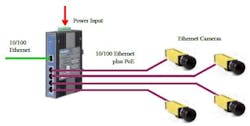One of the more interesting developments in the application of Ethernet in industrial environments has been Power over Ethernet (PoE). If you’re unfamiliar with PoE, the basic idea involves passing electrical power over the same Ethernet lines used to transmit data between systems.
Granted, the level of power available in PoE application is not massive, but it’s not insignificant either. Enough power can be carried via PoE to operate end devices such as security cameras, network routers and switches. And as the number of industrial devices with Ethernet ports, such as sensors, controllers and meters, have proliferated, the potential for PoE seems significant.
The problem is that few people seem to be applying it.
Automation World asked members of its LinkedIn group (bit.ly/automationworld) if any of them were using PoE. To date, the response has been a resounding “no.” Not one person has yet indicated they were using PoE despite having a great deal of interest in it.
Why is this so?
One application I always had in mind for PoE was for powering the linking devices used in a Foundation Fieldbus HSE installation, says Richard Caro, owner of CMC Associates, Quincy, Mass. The problem, according to Caro, is that none of the linking device manufacturers can be powered from the Ethernet line. “Maybe, this is one of the reasons HSE is not used more often. PoE is a great technology, [but] most users have never heard about it,” he says.
Rick Rice, applications engineer at Crest Foods in Rockford, Ill., says that one of the hurdles PoE faces, like any other advance in technology, is its cost of implementation. “Upper management is always interested in the bottom line and, frankly, spending money on the ‘new-fangled stuff’, to use a description I heard while passing a board room recently, just doesn't seem appealing to most decision makers.”
As an industrial technology implementer, Rice says he would “love to use PoE technology” because of what he sees as the clear advantages to the technology ranging from simple wiring to advanced diagnostics and reliability.
Echoing Rice’s comments is Dan Bacon, senior electrical control systems engineer at Tech-Star, Salt Lake City, Utah. “Unfortunately, the best technology, economically and functionally, does not always get implemented due to resistance from upper management,” he says.
Adding that he thinks the push toward wireless may cut off any potential surge for PoE, Johnson Lukose, business manager at Scadatech Engineering in Selangor, Malaysia, says, “PoE was [once] tagged as a game changer, but [now] it is languishing to capture the factory floor. By all accounts it looks like it'll be overtaken by wireless technology. However, I find it doing well in the access control, CCTV and physical security markets.”
What do you think? Are these users on target or are they missing a critical aspect of the PoE issue? Weigh in with your comments at http://linkd.in/lipoediscussion.
If you’re interested in learning more about the latest developments with PoE, visit this white paper on the Automation World site at http://www.automationworld.com/information-management/latest-developments-poe-technology-poe-plus-has-arrived.
About the Author
David Greenfield, editor in chief
Editor in Chief

Leaders relevant to this article:

